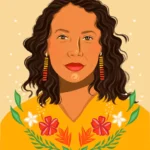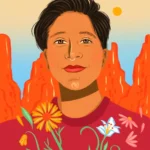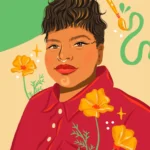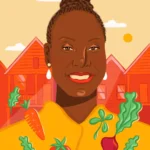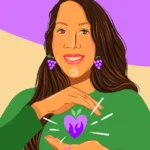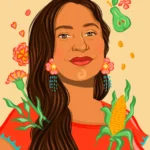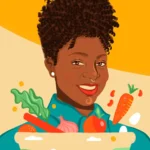Wisdom on Success
When asked to define what success in their work looks like, Climate Resilience contributors responded:
Success is deeply relational
“Success is about empowering community. Everything else is an outcome of transformational relationship-building and power-building. If you’ve done that, you’ll win your campaign. Maybe not in six months or a year, but eventually you will win if you’ve done the foundational work. Success for me is about people.”
Dominique Thomas![Illustration of Dominique Thomas]()
“For me, it’s all about the relationships.”
Kailea Loften![Illustration of Kailea Frederick]()
“When I’m working with a community, I’ve been successful when I’ve built enough trust that they can rely on me to provide information or resources. So much of the work that I do is relationship building. Even if a project falls through, a relationship can persist if trust has been built and there’s a desire for mutual support.”
Natalie Hernandez![Illustration of Natalie Fernandez]()
“I define success by happy faces and inspired, empowered people! Whether I’m getting folks involved in a protest or a wilderness cleanup, I hope people feel joy and pleasure in their activism. I don’t define success in terms of scale because my work is about relationship-building.”
Olivia Juarez![Illustration of Olivia Juarez]()
“My work is successful when people feel seen and feel that they co-own the tools to change systems.”
Marta Ceroni![Illustration of Marta Ceroni]()
“For me, success looks like having land to grow traditional plants, care for the soil, watch plants grow, harvest them, collect their seeds, and hand seeds over to another Indigenous person, so that they can plant those seeds in their own garden and continue to grow that medicine.”
Victoria Montaño![Illustration of Victoria Montaño]()
Success is little by little
“Climate change is the crisis of our time. It is an existential threat for humanity. I have found peace knowing that the work continues, and cannot be tackled alone. So, an important metric of success is that we’re building a movement that has reverberations across generations and across borders.”
Amee Raval![Illustration of Amee Raval]()
“I think success is knowing that you’re still making movements and a change that redirects the flow of power and balances the scales a bit. Success is moving towards a greater balance.”
Cate Mingoya-LaFortune![Illustration of Cate Mingoya LaFortune]()
“I ask myself, am I making progress? Is what I’m doing beneficial to all, not just a contained group? Are we negatively impacting anyone? As long as we’ve been able to make progress, no matter how big or how small, progress is progress.”
Shirell Parfait-Dardar![Illustration of Chief Shirell Parfait-Dardar]()
“Success for me is making small changes towards a bigger goal. One foot in front of the next. Making change one block at a time can make a huge impact. I believe that.”
Janelle St. John![Illustration of Janelle St. John]()
“It’s a moving target, trying to figure out what success in climate resilience looks like. I don’t have the larger indicators for climate resilience success, and I don’t know if I would believe them if I did. So we can talk about success in a different way. I like to look at it as these little shifts in the social dial. With each conversation, event, or interaction, something shifts. It’s incremental. I see it in relationships with people. In mutual aid. In the development of community resources. I see our webs of relationships growing in stronger ways. It’s these culture shifting pieces that feel like the real moments of success for me.” - Mindy Blank
Mindy Blank![Illustration of Mindy Blank]()
Success is tangible
“I feel like, for me, it comes down to having feedback loops. Like, I think that there isn’t a lot of linearity to getting free in general. I think that translates to how I see movement and community work because there’s a sense of, we did an amazing strategic intervention, and it created these new conditions for us, and now that we have these new conditions, what’s our next intervention going to be? It’s not necessarily like, there’s a problem, we have a solution, and now we’re at our endpoint. There is no endpoint. There are new conditions.”
Deseree Fontenot![Illustration of Deseree Fontenot]()
Success is rarely linear
“Success is when it’s very clear that real people are really benefitting. If you can’t see how real people are benefitting, try harder.”
Marcie Roth![Illustration of Marcie Roth]()
“For me, success looks like young people no longer feeling terrified of the future and instead feeling hopeful and powerful and prepared.”
Lil Milagro Henriquez![Illustration of Lil Milagro Henriquez]()
“When we win. People need to see concrete changes in their lives from the things that they’ve done.”
Mariela Ventura![Illustration of Mara Ventura]()
“I have zillions of success metrics, frankly. But fundamentally, the question I’ll be asking myself in a few years will be, did anything we’ve done actually result in emissions reductions? Because I’ve been doing this work now for almost ten years, and especially from my town on the ground, when I was helping cities to set energy targets and helping explain with mapping what it would take to achieve them, it was clear that nobody’s achieving them. I really feel that a critical metric of success is, are we bending the curve down?”
Eileen V. Quigley![Illustration of Eileen V. Quigley]()
Success is not always the goal
“I have to remind myself that I’m 23, and I might not live to see the world that I want to create. That’s a very present reality. I have to ask myself, how can this process be successful without ever reaching ultimate objectives? That doesn’t mean I’ll fight any less for it. But that does mean, if I’m going to dedicate the rest of my work to this fight, that I must find space for joy, rest, and ease. I must understand how important it is to practice radical compassion with myself and how liberatory it is to laugh in community. And I must see the success in the process.”
Ruth Miller![Illustration of Ruth Miller]()
“Success isn’t the goal. My goal isn’t to be successful. Are people healing? Are people reconnecting? Are people getting along, praying together, singing together, eating together? Is the work actually making us better people? Sometimes the work can bring out the worst in us. It’s tiring, taxing, and emotionally draining. There are a lot of forces that can break your spirit. It matters that we don’t lose ourselves, our protocols, our traditions, our ceremonies in the work. That’s what’s important.”
Niria Alicia![Illustration of Niria Alicia]()
When asked to reflect on the largest barriers to success in their work, Climate Resilience contributors responded:
Time
“Building relationships and building trust is hard and takes time. Time can feel so scarce but time also feels made up.”
Dominique Thomas![Illustration of Dominique Thomas]()
“Not enough hours in the day. Everybody will say funding, but I feel like there are ways around that. They’re not easy, but there are ways. Often it’s just time and capacity. I wish I could do more, but that’s also why I try to bring so many people into these projects, because then you get so many different perspectives and so many different people working on the issue.”
Eve Mosher![Illustration of Eve Mosher]()
Inadequate Resources
“I honestly think the challenges we face are really hard, complicated, technical challenges, and even still, the technical part is easy, and the harder part is political and economic. How do we make the dollars that are out there that are getting concentrated in these eddies of self-reinforcing power and very little function and get those resources to flow where they can have real societal impact? The problem is not a limited amount of dollars. The problem is the directionality and control and flow of those dollars. If we had those pieces in place, the technology would follow.”
Heather Rosenberg![Illustration of Heather Rosenberg]()
“One of the biggest challenges is that the organizations doing this work have so few resources. We get pitted against each other. We’re scrapping over too few resources.”
Marcie Roth![Illustration of Marcie Roth]()
A Powerful, Well-Resourced Opposition
“We’re up against some of the biggest, most profitable, and most powerful corporations. When I talk about contesting for power, there’s an interpersonal level, and there’s also an institutionalized level; we’re up against Chevron and the fossil fuel industry. These are entrenched institutions that are not going away without a fight, and they have tremendous resources to be able to influence politics. Community organizations have to build power in different ways. We can’t buy our policies and our candidates. We have to compel people with our vision. We have to build people power, disrupt the status quo, and disrupt the way that the current system follows the money.”
Amee Raval![Illustration of Amee Raval]()
“There are enormous barriers that our country is beholden to the fossil fuel industry in many corridors of power. That’s a huge challenge.”
Eileen V. Quigley![Illustration of Eileen V. Quigley]()
“Even as we see wins and are growing, so too is the response from these major corporations and politicians who are watching the narrative and cultural shift and are going to fight us as hard as they can to keep things in their favor and maintain the status quo and control resources and the earth and the land. It just takes constant imagination and innovation to move forward.”
Mariela Ventura![Illustration of Mara Ventura]()
White Supremacy and Systemic Racism
“White supremacy. How do I put that in a better way? Functioning in white systems. In structures that don’t support community building. It’s highly pervasive also in me and the conditioning that I’ve had. That continues to be the biggest challenge. The nonprofit system and the philanthropy system as well makes it really hard to just be human.”
Irfana Jetha Noorani![Illustration of Irfana Jetha Noorani]()
“Being A Black woman, I think you spend so much time trying to prove yourself. It’s exhausting. You just want to get to the work. The constant having to define and defend yourself. Constantly being judged. Let me work.”
Janelle St. John![Illustration of Janelle St. John]()
“White supremacy is a barrier to my emotional capacity to do this work. There have been countless spaces where I’ve been the only person of color. I’m happy to say that’s not my experience anymore, because my focus has been to organize with a lot of people of color. But if you don’t have that intention, you can find yourself in spaces where 99% of the people there are visibly white. Even though I’ve been able to find a deeper sense of community with people of color, I still have experiences of people tokenizing me or resisting more radical ideas because they’re set in their ways. It’s just very tiresome sometimes. It’s not a permanent barrier, though, and I try to address it by being in community with people of color, by using my best sense to determine whether or not a space feels safe and if I’ll be taken seriously there. I can choose where I want to be right now.”
Olivia Juarez![Illustration of Olivia Juarez]()
“There’s a lack of racial equity lens in the environmental space as a whole. The whole environmentalism movement was founded on a lot of white supremacist ideals, like removing Indigenous peoples from what are now conservation lands, so how do we make sure that as we’re building climate or environmental policies, we’re not exacerbating those ideologies? We need more buy-in from mainstream groups that this is the right thing to do.”
Sona Mohnot![Illustration of Sona Mohnot]()
Compounding Trauma and Oppression
“It’s a space of trauma. Anybody that’s touching this, you’re holding trauma, you’re engaging with trauma, you’re seeing it, in various people to various degrees. There’s a level of care and healing required for this that really isn’t built in. So it can kind of double down on the trauma and create more because of that.”
Sekita Grant![Illustration of Sekita Grant]()
“I think the biggest challenge is the conditions in which our communities find themselves. The communities are constantly under attack. Their ability to do what they need gets stripped away very easily. When people cannot have a certain level of stability, it’s really difficult for people to be able to move a project forward.”
Crystal Huang![Illustration of Crystal Huang]()
“Oftentimes folks are always in crisis, trying to figure out how to keep the lights on or feed their family. Poverty is real. Sometimes that prevents us from being able to invest the time into the things that we want to see happen because we’re so stuck in the “what is” now.”
Cassia Herron![Illustration of Cassia Herron]()
“It’s really hard to focus on larger issues because there are so many day-to-day issues that people are dealing with. For instance, when we try to start a conversation with folks about their high electricity bill or how they’re experiencing extreme heat, they might say, Hey, a kid was just hit by a car on our street and the city refuses to put up a stop sign on the corner. I’m not in a place to talk about systemic issues until my immediate needs are met. That’s a challenge. There’s never enough time to first address all of the super urgent things that people are waiting for. I think that’s intentional. All of the really tiny obstacles are set up by larger systems to keep people from radically transforming them.”
Cate Mingoya-LaFortune![Illustration of Cate Mingoya LaFortune]()
“There’s so much bad to stop that there’s not enough space to build the new. And they’re not mutually exclusive. But the tension in holding what’s needed has been tough.”
Deseree Fontenot![Illustration of Deseree Fontenot]()
“Coming from communities that have historically been dispossessed, oppressed, criminalized, targeted, there’s a lot of trauma and that gets in the way of the work. It tells us that we need to do that work first. But it’s not inseparable. We can’t say that we’re trying to do all these great things if we’re not also healing ourselves.”
Niria Alicia![Illustration of Niria Alicia]()
“The burden of this advocacy so often falls on those most affected by it. Those that are fighting the hardest are also the ones that are targeted and suffering the most. Burnout is a big barrier. There’s a spiritual exhaustion that comes from fighting things that are impacting you on a deep and personal level, that you can’t just turn off when you close your laptop.”
Ruth Miller![Illustration of Ruth Miller]()
Siloed Spaces
“One of the largest barriers at the moment is getting folks to understand how it’s all connected. In funding and policy conversations, many people still haven’t connected the dots between interrelated issues. I’m working from the understanding that Black, Indigenous, and people of color, low income folks, and immigrants bear the brunt of climate change. Therefore, advocating for policies that are going to help those communities, like affordable housing and equitable transportation, is super important. And it’s a central piece of climate change work. It’s a pretty simple concept, but I think we’ve overcomplicated it. So we have these conversations over and over again, explaining how housing connects to transit which connects to wildlife preservation which connects to climate change.”
Natalie Hernandez![Illustration of Natalie Fernandez]()
Conversely, when asked to reflect on the largest drivers of success in their work, Climate Resilience contributors responded:
People Power
“Particularly in a place like Kentucky, the greatest source of power is around poor people organizing together. There are “progressive” groups, Black groups, brown groups, LGBTQ groups- but the power is in us being a collective unit. The power is in us having multistakeholder coalitions of people who share the same visions, who are affected by the same things, and we’re building power that way.”
Cassia Herron![Illustration of Cassia Herron]()
“The best tool that we have is community organizing. And the best leaders that we have are in community-based organizations, who are out there on the frontlines, doing the hard work of community organizing. When I see how organizations respond and are taking the opportunities, because they have to be strategic, because they don’t have so many resources that they can solve one problem at a time and they understand that, there’s a tremendous amount of leadership. There are so many people working hard to activate their whole community to participate. That’s powerful. And there are so many sources of that happening.” - Heather Rosenberg
Heather Rosenberg![Illustration of Heather Rosenberg]()
“There’s so much power in people that can see the darkness and see the hard things that are coming at us and still have incredible hope that our organizing will work and make a difference, that we’ll win.”
Mariela Ventura![Illustration of Mara Ventura]()
Time with Community
“When we’re able to stand together, sing, drum, share food, laugh, and talk story, and have our elders present and have kids running around, when we are able to battle the darkness that we’re confronted with using our community spirit, our collectivity, and our strength to ground us, that is the purest form of power.”
Ruth Miller![Illustration of Ruth Miller]()
“My culture. Ceremony. My mother. My ancestors. My aunties, my elders. The children. The plants, the seeds, the rivers. The ocean, the sky, the earth. Authentic, genuine sisterhood. Fasting, dancing, showering. Chocolate.”
Niria Alicia![Illustration of Niria Alicia]()
Creativity + Joy
“Within the environmental justice, social justice, racial justice movement, we have so much creativity. I feel the most nourished and cognizant of that when I’m a part of marches or protests, like the Global Climate Action Summit in San Francisco in 2018. Being amongst the signs, the tapestries, the music, the drums, the singing and dancing; that energy is unlike anything else. Community building is joyful! It’s powerful both to contest against the forces that are fighting to drown out our voices, but also because it’s deeply fulfilling and joyful work.”
Amee Raval![Illustration of Amee Raval]()
“[My greatest source of power is] my ability to retain a level of joy. I think I’ve been able to remain very soft in a multitude of hard places.”
Jacqueline Thanh![Illustration of Jacqueline Thanh]()
Visioning and Inner Work
“The greatest sources of power for me are seeing communities together, happy and loving up on one another, visioning together, and creating something different that didn’t exist. That’s so powerful. You can’t strip that from people. You can’t take that away. If I see it in my mind, you can’t tell me that it isn’t real. I see collective liberation in my mind right now. I see people who look like me there. You can’t say anything to take that vision away from me.”
Dominique Thomas![Illustration of Dominique Thomas]()
“I think it comes back to this inner work, to listening in really deeply, and to creating enough space to be able to listen in and form original ideas. I find great power from that place. It’s a pause. I think that’s where some major alchemy happens.”
Mindy Blank![Illustration of Mindy Blank]()
Ancestral Wisdom and Relationships
“I think it’s ancestral knowledge. One of the reasons I find so much love and hope in the communities disproportionately oppressed by the system is that many still have connection to ancestral wisdom. They still have the knowledge that is deeply connected to how we used to be before we unconsciously decided to destroy the world. As long as those seeds are still there, there are people who will keep showing up with a true understanding of what people power means… understanding what we deserve and that we can actually take it back by collectively building wealth with each other.”
Crystal Huang![Illustration of Crystal Huang]()
“There’s a lot of responsibility in my work. I think that’s where people tend to fall short. They look at the so-called “power” that they possess, but they forget their responsbiilities. Truthfully, that’s all it is. We have responsibility. As long as I remind myself of my responsibilities, not just as an Indigenous person but as a human being in general, that’s where I can create the progress that’s necessary for the people that I’ve sworn to represent.”
Shirell Parfait-Dardar![Illustration of Chief Shirell Parfait-Dardar]()
“There are a few people who are no longer with us who are always in my ear, on my shoulder, kicking my ass. Because the World Institute on Disability has an incredible legacy, I feel both a deep sense of obligation and a huge surge of stardust.”
Marcie Roth![Illustration of Marcie Roth]()
Youth
“I think the youth are the greatest sources of power. They get all of this on a really instinctual level. Youth are at a really interesting nexus where they both have a crystal clear view of fairness, justice, and what’s not working, but they also have hope and a vision of what’s possible, and that hasn’t necessarily been tamped down yet. They’re at a really transformational intersection of being critical of the world but also having enough emotional energy and creative capacity for hope and acts of imagination, in a way that adults have a huge deficit for. Middle schoolers, high schoolers, and young college folks are at that sweet spot. They don’t get enough respect for their clear-eyedness.”
Cate Mingoya-LaFortune![Illustration of Cate Mingoya LaFortune]()
“I feel like so many adults give the answer, “It’s those young people! They’re so hopeful!” I don’t want to say that. I get the sense that many young people really dislike it, especially when they’re not given any institutional power, and they see these adults not taking any proactive measures to take action to safeguard their future. That being said, the creativity of youth is a source of ridiculous strength for me. It makes me so giddy whenever we have a Dungeons and Dragons campaign. The power of play is so exciting for me. That imaginative play that isn’t boxed in by the constraints of the world is so powerful. As adults, we become really boxed in just through the process of socialization. I think young people don’t have that as much because they still are becoming socialized. That creativity is really, really powerful to see.”
Lil Milagro Henriquez![Illustration of Lil Milagro Henriquez]()
The More-Than-Human World
“The more I put my hands back in the soil and continually be present with the cycles and processes, the more energy I have to share the things I share and do the things I do. If I’m not in some constant reflective relationship with place, it all just becomes ideas and I don’t feel attached or grounded in anything. Sometimes I just need 30 minutes of observation and walking each day and checking in on my seeds, in relationship to people and ancestry. That has to be the real fuel and the real wealth of the world. That’s where I find my power- when I just connect outside of the human circles and be present with the land.”
Deseree Fontenot![Illustration of Deseree Fontenot]()
“I’m an herbalist so I’m going to say the plants, for me, absolutely! The plants have been here since before we were here. They have so much to teach us about how to be in this world and also how to honor the sacredness of life and how to be in a loving and reciprocal relationship, how we need each other and how that’s beautiful and what it means to accept and welcome in the abundance of this earth and also take care of it. So that is a really great source of power for me and a place I go back to, especially when I need a break.”
Melissa Reyes![Illustration of Melissa Reyes]()
“For me, nature is such a huge source of power for me personally and professionally. This entire ecosystem, humans included, is why I do this work. We live really close to the beach so I just went and put my feet in the water before coming back here to be able to have this conversation with you. The ocean provides some really beautiful energy and perspective, and wisdom and how to proceed. Biomimicry is a whole thing. Like, how do we learn from the environment? That’s definitely a source of inspiration and power.”
Sekita Grant![Illustration of Sekita Grant]()

